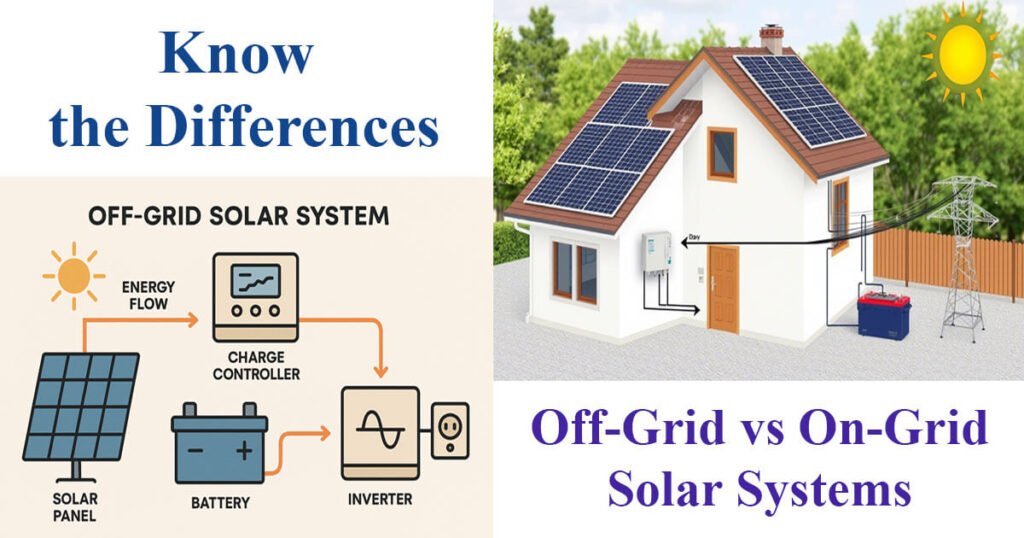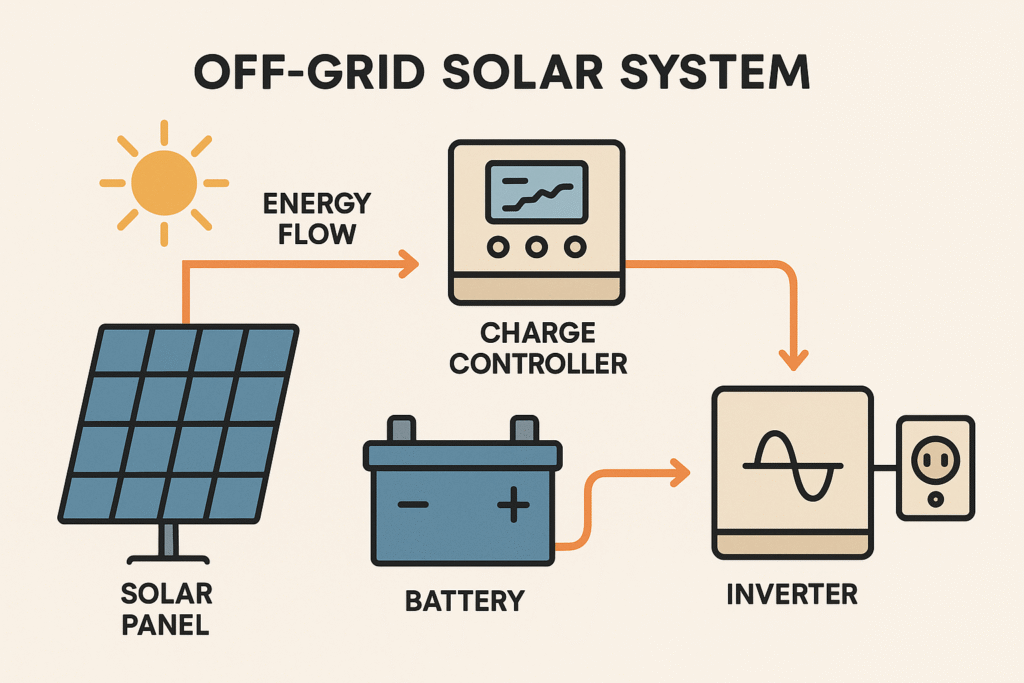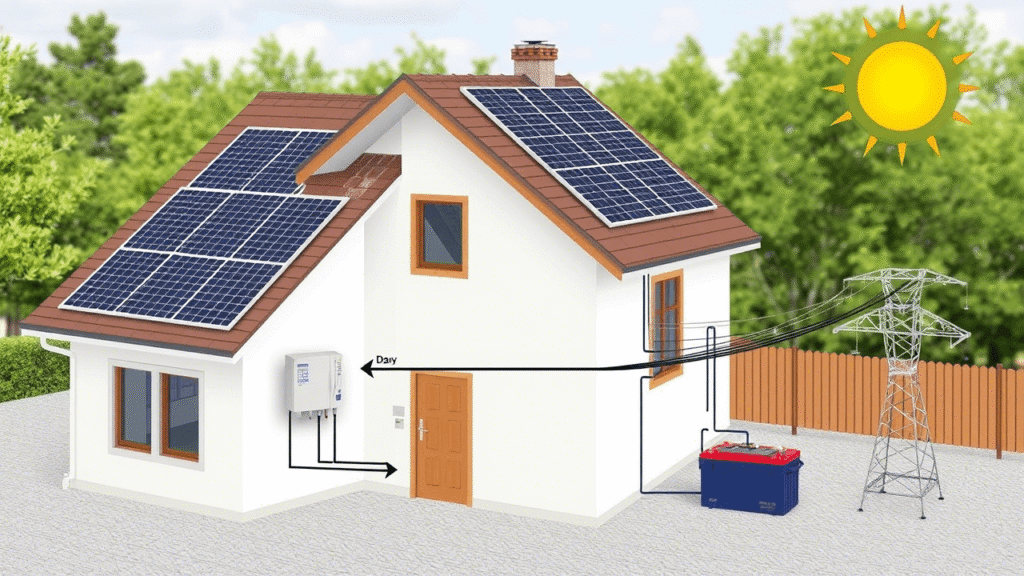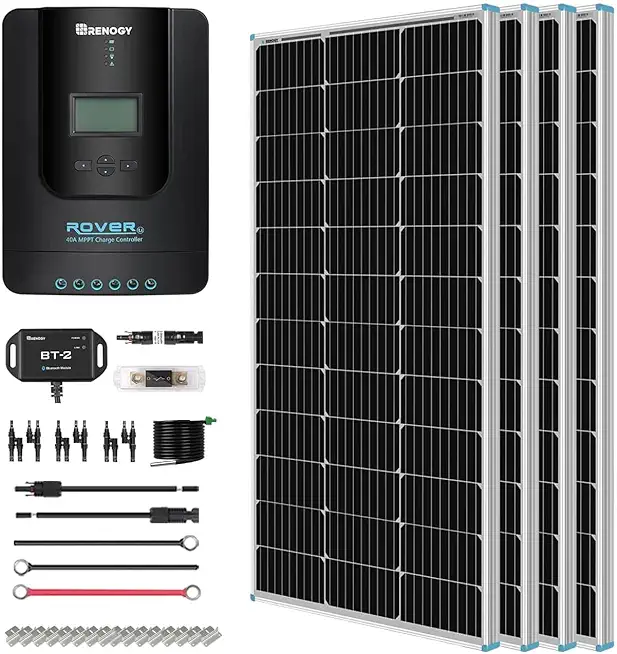About the main differences between off grid vs on grid solar system : Are you considering switching to solar energy but unsure whether an off-grid or on-grid system is right for you? With the rising popularity of renewable energy, understanding the differences between these two systems can save you time, money, and headaches.
In this article, I’ll share everything you need to know about off-grid vs on-grid solar systems, including how they work, their pros and cons, cost comparisons, and our final recommendation.
Whether you’re a homeowner, business owner, or just curious about solar power, this guide has got you covered.
Off-Grid vs On-Grid Solar Systems: Which One’s Right for You?
Overview of Off-Grid and On-Grid Systems:
First of all, let’s establish a basic understanding of what off-grid and on-grid solar systems are.
- Off-Grid Solar Systems: These systems operate independently of the utility grid. They rely on solar panels, batteries, and sometimes backup generators to store and supply electricity.
- On-Grid Solar Systems: Also known as grid-tied systems, these are connected to your local utility grid. They allow you to use solar energy when the sun is shining and draw power from the grid when needed.
Both systems have unique advantages and challenges, which I’m telling you in detail below.
Off-Grid vs On-Grid Solar Systems: Key Differences
When deciding between off-grid vs on-grid solar systems, it’s essential to weigh factors like location, budget, energy needs, and environmental goals.

How Each System Works
Let’s know about how each system works.
Off-Grid Solar Systems
An off-grid system is entirely self-reliant. Here’s how it works:
- Solar panels capture sunlight and convert it into electricity.
- The electricity is stored in batteries for later use.
- An inverter converts the stored DC (direct current) electricity into AC (alternating current) for powering appliances.
- If the battery runs out, a backup generator may kick in.

On-Grid Solar Systems
An on-grid system is interconnected with the utility grid. Here’s how it functions:
- Solar panels generate electricity during daylight hours.
- Excess electricity is sent back to the grid, often earning you credits through net metering.
- When the panels aren’t producing enough (e.g., at night), you draw electricity from the grid.

You can learn: Different Types of Solar Panels Explained (Monocrystalline vs. Polycrystalline).
Pros and Cons of Off-Grid Solar Systems
Pros:
- Energy Independence : No reliance on utility companies or fear of power outages.
- Remote Access : Ideal for rural or remote areas without access to the grid.
- Eco-Friendly : Fully sustainable and reduces your carbon footprint.
Cons:
- Higher Initial Costs : Batteries and additional components can be expensive.
- Maintenance Requirements : Regular upkeep of batteries and inverters is necessary.
- Limited Energy Storage : During prolonged cloudy days, you might run out of power.
Pros and Cons of On-Grid Solar Systems
✅ Pros
✔ Lower initial cost – No need for expensive battery storage.
✔ Net metering benefits – Earn credits for excess energy sent to the grid.
✔ Reliable power supply – Grid acts as a backup when solar isn’t enough.
❌ Cons
✖ No power during outages – Most systems shut off for safety (unless hybrid).
✖ Dependent on the grid – Utility policies and rates can change.
✖ Not ideal for remote locations – Requires grid access.
Cost Comparison: Off-Grid vs On-Grid Solar Systems
When comparing off-grid vs on-grid solar systems , cost is a significant factor. Here’s a example:
| System Type | Initial Cost | Long-Term Savings |
| Off-Grid | High (due to batteries) | High (no utility bills) |
| On-Grid | Moderate (grid connection fee) | Moderate (net metering benefits) |
While off-grid systems have higher upfront costs, they eliminate monthly utility bills entirely. On the other hand, on-grid systems are more affordable initially but still involve some reliance on the grid.
Estimated Cost and Durability Table Demo
| Factor | Off-Grid System | On-Grid System |
| Initial Cost | $300 – $700+ | $150 – $300+ |
| Battery Cost | $50 – $200 | Not required |
| Maintenance | Higher (batteries) | Lower |
| Lifespan | 20-30 years (panels), 5-15 years (batteries) | 25-30 years (panels) |
That is, we understood that: Off-grid systems are more expensive due to battery storage, while on-grid systems are more affordable but rely on utility companies.
Final Recommendation: Which One Should You Choose?
- Choose off-grid if you:
- Live in a remote area without grid access.
- Want complete energy independence.
- Don’t mind higher upfront costs and maintenance.
- Choose on-grid if you:
- Want to reduce electricity bills with net metering.
- Prefer a lower-cost, low-maintenance system.
- Have reliable grid access.
For most homeowners, on-grid solar is the practical choice, while off-grid is best for those seeking self-sufficiency.
Ready to Go Solar? Get a Free Quote Today!
Still unsure which system is right for you? Consult a solar expert to assess your energy needs and location. Switching to solar is a smart investment; but should to make sure you choose the best option for your lifestyle!
By understanding the differences between off-grid vs on-grid solar systems, you can make an informed decision that aligns with your energy goals. Whether you prioritize savings or independence, solar power is a step toward a sustainable future.
Which system appeals to you more? Share your thoughts in the comments! 🌞



